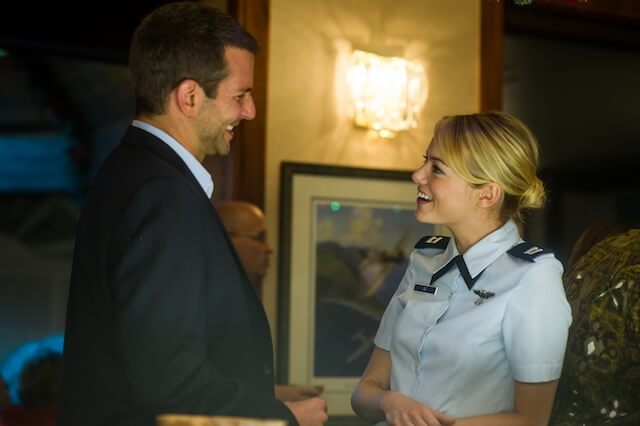‘Aloha’ Usually when a movie has been clearly gutted by a studio they try to subtract the filmmaker’s voice. The film will be all plot, little character; there will be lots of montages where large chunks of story once stood. “Aloha” may be the strangest studio hack-up ever. It’s as though it was cut up on random. The voice of the filmmaker, Cameron Crowe, is in-tact, and scenes that would serve no narrative purpose, there to add color, remain. Meanwhile certain important bits — like, well, the basics of the plot and why anyone is doing anything at any given time — seem to have been removed. As such, the movie sometimes makes little sense, moving rudderless through a story that seems to have both too much plot and not enough. And yet it’s like the common read on Howard Hawks “The Big Sleep”: it’s incoherent as narrative but every scene is great. OK, not every scene is great, per se, but every scene is alive and often weird, if sometimes chaotic in a way that doesn’t always, but sometimes does, seem intentional. As with many Crowe films, it opens with a confessional narration from its hero, in this case Brian Gilchrest (Bradley Cooper), a former NASA specialist turned freelance defense contractor who arrives in Hawaii for…something. It might be buried in the opening, but it’s so jam-packed and jumbled little makes sense. What matters is he’s a character, like Crowe’s Jerry Maguire, in need of redemption, and also that there are girls to choose from: Tracy (Rachel McAdams), an ex he hasn’t seen in 13 years, who now has a husband (John Krasinksi) and two children: and Allison Ng (Emma Stone), a Type-A air force pilot tasked with carting him around the islands on his super-secret mission. Crowe was once, with “Jerry Maguire,” a star director; now, thanks to eccentric boondoggles like “Vanilla Sky” and “Elizabethtown,” he’s a troubled child. Crowe is only 57, and “Aloha” is only his eighth ever fiction feature, but it bears the hallmarks of a late period film by a relaxed master, riffing on the themes that run through a career’s worth of films and coasting on the distinguished personality of its maker. Crowe does not care about the plot he himself wrote, nor its topicality. Brian’s business involves the privatization and militarization of America’s more or less aborted NASA program (an idea that, as it happens, also cropped up in “Tomorrowland’), with Brian working for a probably evil millionaire. But Crowe’s heart lies elsewhere, and even the probably evil millionaire is played by Bill Murray, in full-on sad eyes mode. Murray even gets to get down, for no reason than for fun, to Tears for Fears with Emma Stone. Crowe is too much of a softie to even take down the people actually ruining the world. On one level that’s disappointing; on another that’s profoundly endearing. Ditto Crowe’s knack for cramming scenes with his patented clever, catchy, sometimes aphoristic dialogue. A single scene has so many funny and/or pithy one-liners it sometimes feel like it’ll capsize; the actors even race through them, otherwise the movie would never end. Crowe makes movies so infrequently these days — this is his second since “Elizabethtown,” 10 years ago — you can understand he just wants to cram as much stuff into any film he’s making, just in case it’ll be another five years, or more, till his next shot. The whole of “Aloha” has this feeling. It’s a delightful mess — a highly eccentric work that, somehow, incredibly, wound up feeling eccentric even after clear studio interference. Whoever snipped it up failed to make something more sell-able out of it. If it makes any money it’ll be due to star power. Cooper, like the film itself, gets off to a rough start, seemingly unsure of what he’s doing, then hits a groove. It’s no shock that Stone and McAdams fit right into the Crowe-iverse, though neither, it should be noted, is strictly manic or pixie, despite both being dream girls. Stone is an uptight type who learns to literally let her hair down, but you can sense Crowe, aware of the notorious “Manic Pixie Dream Girl” type he had written in the likes of “Elizabethtown,” trying to steer clear of those mannerisms — yet still embracing many of them, because he’s still Cameron Crowe. It’s almost a thin character, though Stone, in her infinite wisdom, makes her real, complete with a sunglasses hat. Though “Aloha” is definitely a Cameron Crowe movie, there’s a feeling of trying new things, from heading off to Hawaii — a mostly white-washed Hawaii, though Crowe spends an entire reel hanging with the real separatist sovereign nation — or creating an entire character, amusingly played by John Krasinski, who mostly communicates through loaded facial expressions rather than words. Crowe himself is a man of words — of dialogue that becomes catchphrases and quotables, of heart-on-sleeve confessionals set to earnest pop songs. He doesn’t get fully away from that, but in this sometimes clumsy, usually fun, more-silly-than-serious outing, he makes a renewed case for himself as a singular artist. This is a movie, for better or worse, but generally for better, with a real voice. Follow Matt Prigge on Twitter @mattprigge
Director: Cameron Crowe
Stars: Bradley Cooper, Emma Stone
Rating: PG-13
3 (out of 5) Globes
‘Aloha’ makes no sense, is pretty fun anyway

Columbia Pictures


















